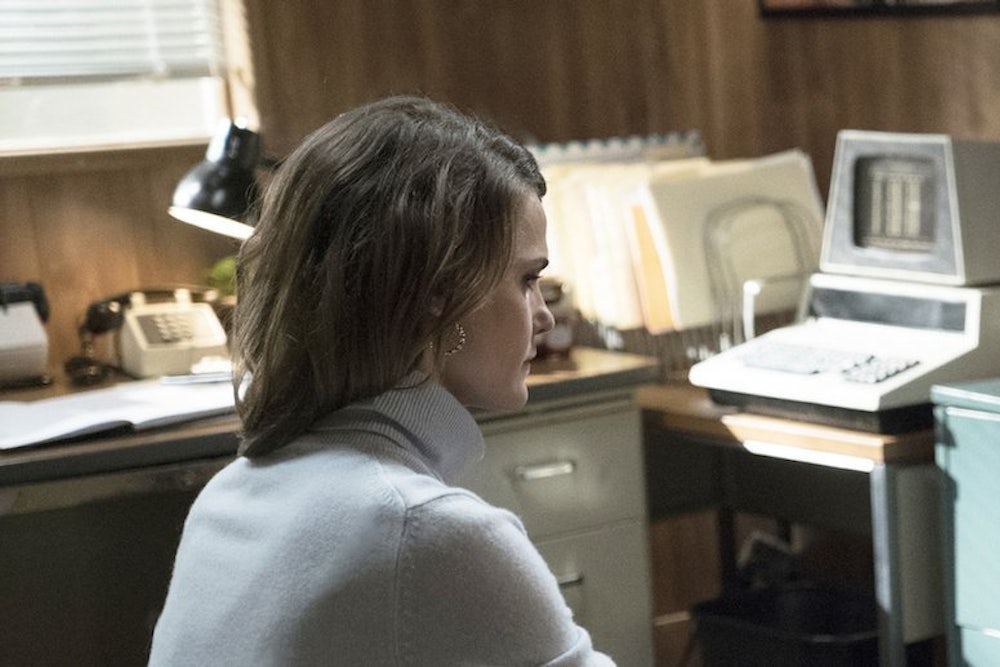“The Americans” begins its third season this Wednesday night, and I’m happy to say it’s as impossibly good as it was last year. Sleek but not slick, more elegant and sexy and confident than anything else on television, the show finds a happy medium between the quick thrills and breakneck plotting of shows like “Scandal” and “Homeland,” and the slow, deliberate pace of “Rectify” and “The Leftovers.”
Ostensibly, “The Americans” is the story of two Soviet spies living incognito in a northern Virginia suburb. But the real appeal of the show lies not just in its updated, Americanized rendering of Tinker Tailor. The FX spy drama pairs the suspense of Cold War espionage with domestic melodrama to create something new: an existential thriller about the emotional struggles of family.
For its first two seasons, Elizabeth (Keri Russell) and Philip Jennings (Matthew Rhys) tried to compartmentalize their two lives: they sat down for family dinners, then got stuck in high-speed car chases after the kids were asleep. (An offhanded reference to “the babysitter” every couple of episodes became something like a joke; a wink to the logistical impossibility of the Jennings’ shenanigans.) The greatest new threat to the undercover KGB agents is that the borders of those lives have begun to disintegrate. Their job doesn’t just bleed into their personal lives; their lives are the job.
At the end of its near-perfect second season, Elizabeth and Philip learned that the KGB wanted to recruit their teenage daughter Paige to the cause. As natural-born citizens, these “second generation illegals” could be the perfect secret agents, sliding through security clearances and infiltrating top levels of the CIA or other branches ofthe U.S. government. Philip, a dedicated but more questioning soldier for the cause, is horrified by the idea. For Elizabeth, the true believer, the prospect holds out the hope of an authentic relationship with her daughter—and the chance to mold Paige in her own image.
This conflict—what kind of life do we want for our children?—turns the new season of “The Americans” into TV’s most astute exploration of parenthood. (Cannier than the TV show actually named “Parenthood,” which happens to be ending this week.) It’s not exactly a new question for TV drama. It’s not even a new question for shows that have dealt with secret, sometimes subversive lives. Tony Soprano wanted his children to stay out of the family business, to grow up to have normal, safe lives. (He was constantly boasting that his daughter Meadow planned to become a pediatrician.) He failed. Walter White constantly stated that he was building his meth empire for the well-being of his family, but he wanted his son to have nothing to do with it. You might say he succeeded—but only because Walt Jr. ended the series hating his father.
Pushing this issue is their new KBG handler, Gabriel (Frank Langella), who is eager for them to begin preparing Paige. Gabriel is warm and erudite and has an avuncular relationship with Elizabeth. He plays scrabble and he cooks gourmet meals. They trust him, unlike their previous handlers. But on “The Americans,” no relationship is straightforward: Watching Elizabeth join Paige at church, Philip sees both a mother speeding time with her daughter and a spy developing an asset. Work-life balance no longer exists.
This idea—that total devotion to a cause has ramifications well beyond professional success or failure—is at the center of the show. Just look at the parallel plot involving Elizabeth and Philip’s credulous neighbor, Stan—played by Noah Emmerich—who has devoted his life to the FBI, and is only now realizing the consequences.
The show is sadder this season, its characters burdened by the weight of violence and the psychological and moral toll of betrayals. They do terrible, terrible things, and the show doesn’t gloss over or fetishize that ugliness. When Elizabeth and Philip need to dispose of a body in the second episode, we see what that means: bending limbs, the sound of bones cracking. When Elizabeth gets hurt, the bruises don’t quickly disappear. And when Philip and Elizabeth disagreed over Paige’s fate at the end of the second season, we knew that this discord would linger in the third. There’s a cost to what they do, and “The Americans” never lets us forget.
